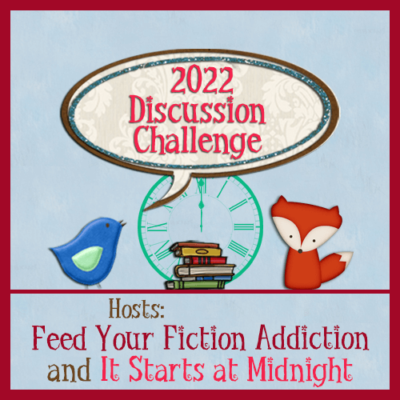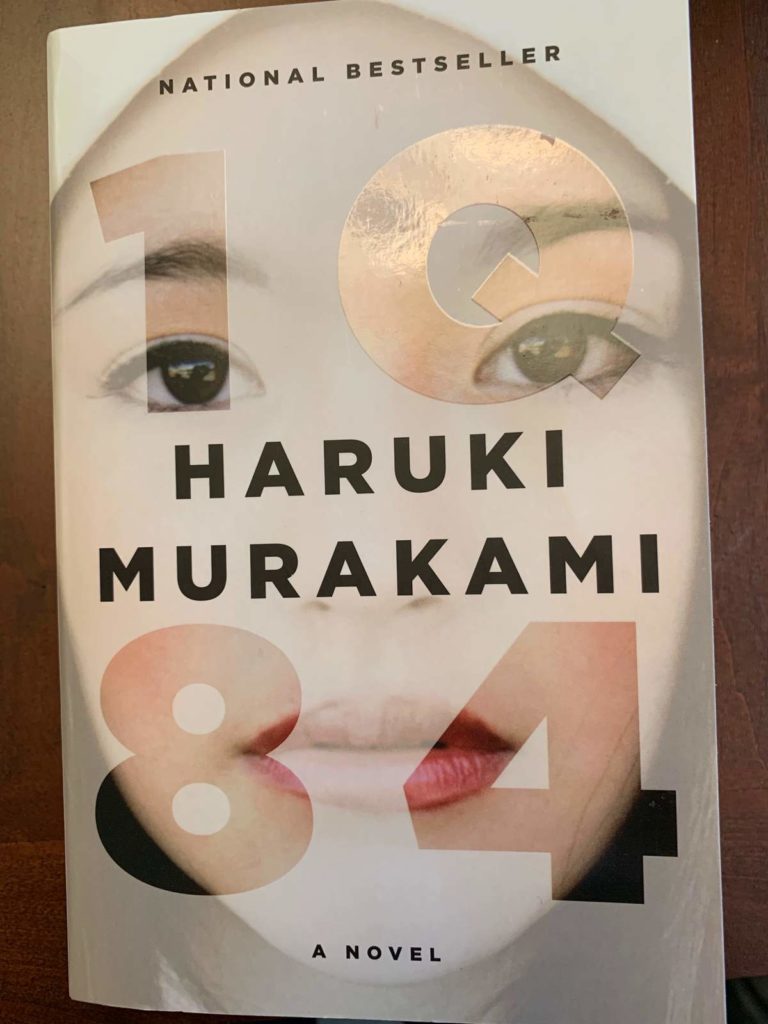
Thanks to these two bloggers for sponsoring the 2022 Blog Discussion Challenge:
- Nicole at Feed Your Fiction Addiction
- Shannon at It Starts at Midnight

Murakami, Haruki. 1Q84
Trans. by Jay Rubin & Philip Gabriel
Vintage, translation © 2011
Trade Paperback, 1,157 pages
ISBN 978-0-307-47646-3
Highly Recommended

“
A young woman named Aomame follows a taxi driver’s enigmatic suggestion and begins to notice puzzling discrepancies in the world around her. She has entered, she realizes, a parallel existence, which she calls 1Q84 —“Q is for ‘question mark.’ A world that bears a question.” Meanwhile, an aspiring writer named Tengo takes on a suspect ghostwriting project. He becomes so wrapped up with the work and its unusual author that, soon, his previously placid life begins to come unraveled.
As Aomame’s and Tengo’s narratives converge over the course of this single year, we learn of the profound and tangled connections that bind them ever closer: a beautiful, dyslexic teenage girl with a unique vision; a mysterious religious cult that instigated a shoot-out with the metropolitan police; a reclusive, wealthy dowager who runs a shelter for abused women; a hideously ugly private investigator; a mild-mannered yet ruthlessly efficient bodyguard; and a peculiarly insistent television-fee collector.
A love story, a mystery, a fantasy, a novel of self-discovery, a dystopia to rival George Orwell’s—1Q84 is Haruki Murakami’s most ambitious undertaking yet . . .
I’ve labeled this post a review, but it really isn’t that at all. Something like “thoughts on” or “reactions to” would be more accurate. This giant novel has stuck with me not primarily because of its content, but because of the time when I read it.
Like a lot of other people, I was nearly overwhelmed by the arrival of the COVID-19 pandemic in March 2020. This period of uncertainty and anxiety initially made it impossible for me to focus long enough to either read or write (an experience you can read about here).
When I began to emerge from that phase, I was able to read but still couldn’t concentrate long enough to write a cogent review of the books I read. That was when I decided that if I was just going to read, I might as well choose a book that would keep me occupied for quite a while. At 1,157 pages, 1Q84, which had been on my TBR shelf for some time, seemed like the perfect choice.
I’d never read anything by Haruki Murakami before and didn’t remember exactly why I had bought this book, so I took it off the shelf and opened it with no particular expectations. I immediately fell deep into a world that didn’t make much sense but kept moving compellingly forward—just like the real world outside my little bubble of isolation. With no idea of what it all meant or how it might turn out, I kept reading, drawn along by the narrative force and eager to see what would happen.
I never once doubted that the paths of the young man Tengo and the young woman Aomame would eventually intersect. When they each began seeing two moons—an astronomical impossibility in what we usually call “the real world”—I understood that the story has stepped out of the world of reality and into the world of fantasy.
Yet this alternate fantasy world isn’t completely different from reality:
The concepts of time, space, and possibility.
Tengo knew that time could become deformed as it moved forward. Time itself was uniform in composition, but once consumed, it took on a deformed shape. . . . Occasionally the order of things could be reversed, and in the worst cases order itself could vanish entirely. Sometimes things that should not be there at all might be added onto time. By adjusting time this way to suit their own purposes, people probably adjusted the meaning of their existences. (p. 344)
This description of how people adjust time and how that adjustment probably also adjusts the meaning of their experiences is exactly what we do when we remember particular life experiences and how they have shaped our identity. The significance of events in our lives lies not in their actual timing or sequence but in our memory of when, how, and why they occurred. This is why siblings often remember key family events quite differently, with all of them finding their unique, individual significance in those events.
Later, Tengo tells Aomame that the presence of two moons is the sign that indicates the time tracks of 1984 and 1Q84 have been switched, “and the world was transformed into 1Q84” (p. 577). However, “the number of people who know that this is 1Q84 is quite limited” (p. 577).
And I was content to be one of that limited number of people trying, along with Tengo and Aomame, to make sense of a world that had suddenly jumped the tracks of the known and had entered a new realm where things kept changing again and again. Despite the strangeness of the world of 1Q84, I never once lost interest in the adventure. And I kept turning all those pages, wondering whether even this many would be enough.
There’s a lot more to 1Q84 than my reactions here. For instance, what exactly are the comparisons and contrasts between it and George Orwell’s 1984? What does the story by the dyslexic teenage author have to do with the experiences of Tengo and Aomame? Who are The Little People, and what do they signify? Does the novel truly need to be this long? In fact, in the end, what does it all mean?
Maybe someday I’ll reread 1Q84 and look for answers to all those questions. And if I do, maybe my critical faculties will evaluate the book differently.
But I probably won’t reread it. I think I’d rather retain the memory of a long journey with a book that helped me through a particularly difficult time.
We find the books we need when we need them. That’s the way I want to remember my encounter with 1Q84.
© 2022 by Mary Daniels Brown

